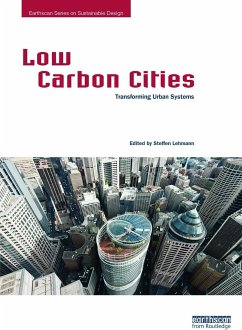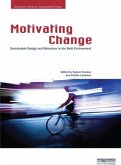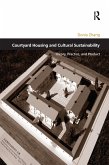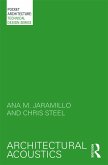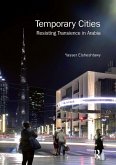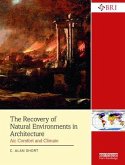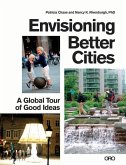Low Carbon Cities
Transforming Urban Systems
Herausgeber: Lehmann, Steffen
Schade – dieser Artikel ist leider ausverkauft. Sobald wir wissen, ob und wann der Artikel wieder verfügbar ist, informieren wir Sie an dieser Stelle.
Low Carbon Cities
Transforming Urban Systems
Herausgeber: Lehmann, Steffen
- Broschiertes Buch
- Merkliste
- Auf die Merkliste
- Bewerten Bewerten
- Teilen
- Produkt teilen
- Produkterinnerung
- Produkterinnerung
This collection features essays on ecologically sustainable cities by leading exponents of urban sustainability, case studies of the new directions low carbon cities might take and investigations into how we can mitigate urban heat stress in our cities' microclimates.
Andere Kunden interessierten sich auch für
![Motivating Change: Sustainable Design and Behaviour in the Built Environment Motivating Change: Sustainable Design and Behaviour in the Built Environment]() Motivating Change: Sustainable Design and Behaviour in the Built Environment96,99 €
Motivating Change: Sustainable Design and Behaviour in the Built Environment96,99 €![Courtyard Housing and Cultural Sustainability Courtyard Housing and Cultural Sustainability]() Donia ZhangCourtyard Housing and Cultural Sustainability58,99 €
Donia ZhangCourtyard Housing and Cultural Sustainability58,99 €![Shaping the American Interior Shaping the American Interior]() Shaping the American Interior50,99 €
Shaping the American Interior50,99 €![Architectural Acoustics Architectural Acoustics]() Ana JaramilloArchitectural Acoustics54,99 €
Ana JaramilloArchitectural Acoustics54,99 €![Temporary Cities Temporary Cities]() Yasser ElsheshtawyTemporary Cities59,99 €
Yasser ElsheshtawyTemporary Cities59,99 €![The Recovery of Natural Environments in Architecture The Recovery of Natural Environments in Architecture]() C Alan ShortThe Recovery of Natural Environments in Architecture89,99 €
C Alan ShortThe Recovery of Natural Environments in Architecture89,99 €![Envisioning Better Cities Envisioning Better Cities]() Patricia ChaseEnvisioning Better Cities20,99 €
Patricia ChaseEnvisioning Better Cities20,99 €-
-
-
This collection features essays on ecologically sustainable cities by leading exponents of urban sustainability, case studies of the new directions low carbon cities might take and investigations into how we can mitigate urban heat stress in our cities' microclimates.
Produktdetails
- Produktdetails
- Verlag: Taylor & Francis
- Seitenzahl: 446
- Erscheinungstermin: 16. September 2014
- Englisch
- Abmessung: 246mm x 172mm x 30mm
- Gewicht: 1194g
- ISBN-13: 9780415729833
- ISBN-10: 0415729831
- Artikelnr.: 40887751
- Herstellerkennzeichnung
- Libri GmbH
- Europaallee 1
- 36244 Bad Hersfeld
- gpsr@libri.de
- Verlag: Taylor & Francis
- Seitenzahl: 446
- Erscheinungstermin: 16. September 2014
- Englisch
- Abmessung: 246mm x 172mm x 30mm
- Gewicht: 1194g
- ISBN-13: 9780415729833
- ISBN-10: 0415729831
- Artikelnr.: 40887751
- Herstellerkennzeichnung
- Libri GmbH
- Europaallee 1
- 36244 Bad Hersfeld
- gpsr@libri.de
Steffen Lehmann is Founding Director of the Zero Waste Research Centre for Sustainable Design and Behaviour at the University of South Australia. He is a widely published author and scholar, and is Founding Director of the s_Lab Space Laboratory for Architectural Research and Design (Sydney-Berlin). A German-born architect and urban designer, he was editor-in-chief (2007-2014) of the US-based Journal of Green Building and an advisor to the Australian and German governments, city councils and industry. Since July 2014 he has been Head of School in the School of Built Environment at Curtin University, Perth.
Foreword Preface Introduction: Low carbon cities - more than just buildings
Part I: Classic texts on ecologically sustainable cities: conceptual
evolutions and different schools of thought 1. Ecopolis - the regenerative
city 2. Much better than climate change adaptation 3. Imagining biophilic
cities 4. Sustainable cities are solar responsive cities 5. Trends in low
carbon transport and urban development in thirty-three cities, 1995 to 2005
6. How city dwellers affect their resource hinterland - a spatial impact
study of Australian households Part II: New directions: designing for low
carbon cities 7. Future ecological design as urbaneering: new positions on
city-making without scale 8. A planning approach for the transformation to
low carbon cities 9. Green districts and carbon engineering: increasing
greenery, reducing heat island effects and generating energy 10. From green
buildings to sustainable urban design: two case studies 11. Urban
reclamation and regeneration in Seoul, South Korea 12. From sustainable to
low carbon cities: is India's urban transformation triggering a paradigm
shift? Part III: Urban micro climates: mitigating urban heat stress 13. The
urban heat island and low carbon cities 14. A holistic view of the effects
of urban heat island mitigation 15. Urban micro climates: mitigating urban
heat stress 16. Energy reduction using natural ventilation in city planning
17. The impact on the increase of urban air temperature on planning and
building energy consumption in tropical urban climates 18. Urban heat
islands: case studies from Frankfurt am Main, Arnhem and Ho-Chi-Minh City
19. The green plot ratio and the role of greenery in low carbon living 20.
Urban populations' vulnerability to climate extremes: mitigating urban heat
through technology and water-sensitive urban design 21. Multi-scale
analysis of surface layer urban heat island effect in five higher density
precincts of central Sydney 22. Looking ahead: Applying low carbon
principles to shift urban design paradigms in the Asia-Pacific region
towards green urbanism Glossary Bibliography Index
Part I: Classic texts on ecologically sustainable cities: conceptual
evolutions and different schools of thought 1. Ecopolis - the regenerative
city 2. Much better than climate change adaptation 3. Imagining biophilic
cities 4. Sustainable cities are solar responsive cities 5. Trends in low
carbon transport and urban development in thirty-three cities, 1995 to 2005
6. How city dwellers affect their resource hinterland - a spatial impact
study of Australian households Part II: New directions: designing for low
carbon cities 7. Future ecological design as urbaneering: new positions on
city-making without scale 8. A planning approach for the transformation to
low carbon cities 9. Green districts and carbon engineering: increasing
greenery, reducing heat island effects and generating energy 10. From green
buildings to sustainable urban design: two case studies 11. Urban
reclamation and regeneration in Seoul, South Korea 12. From sustainable to
low carbon cities: is India's urban transformation triggering a paradigm
shift? Part III: Urban micro climates: mitigating urban heat stress 13. The
urban heat island and low carbon cities 14. A holistic view of the effects
of urban heat island mitigation 15. Urban micro climates: mitigating urban
heat stress 16. Energy reduction using natural ventilation in city planning
17. The impact on the increase of urban air temperature on planning and
building energy consumption in tropical urban climates 18. Urban heat
islands: case studies from Frankfurt am Main, Arnhem and Ho-Chi-Minh City
19. The green plot ratio and the role of greenery in low carbon living 20.
Urban populations' vulnerability to climate extremes: mitigating urban heat
through technology and water-sensitive urban design 21. Multi-scale
analysis of surface layer urban heat island effect in five higher density
precincts of central Sydney 22. Looking ahead: Applying low carbon
principles to shift urban design paradigms in the Asia-Pacific region
towards green urbanism Glossary Bibliography Index
Foreword Preface Introduction: Low carbon cities - more than just buildings
Part I: Classic texts on ecologically sustainable cities: conceptual
evolutions and different schools of thought 1. Ecopolis - the regenerative
city 2. Much better than climate change adaptation 3. Imagining biophilic
cities 4. Sustainable cities are solar responsive cities 5. Trends in low
carbon transport and urban development in thirty-three cities, 1995 to 2005
6. How city dwellers affect their resource hinterland - a spatial impact
study of Australian households Part II: New directions: designing for low
carbon cities 7. Future ecological design as urbaneering: new positions on
city-making without scale 8. A planning approach for the transformation to
low carbon cities 9. Green districts and carbon engineering: increasing
greenery, reducing heat island effects and generating energy 10. From green
buildings to sustainable urban design: two case studies 11. Urban
reclamation and regeneration in Seoul, South Korea 12. From sustainable to
low carbon cities: is India's urban transformation triggering a paradigm
shift? Part III: Urban micro climates: mitigating urban heat stress 13. The
urban heat island and low carbon cities 14. A holistic view of the effects
of urban heat island mitigation 15. Urban micro climates: mitigating urban
heat stress 16. Energy reduction using natural ventilation in city planning
17. The impact on the increase of urban air temperature on planning and
building energy consumption in tropical urban climates 18. Urban heat
islands: case studies from Frankfurt am Main, Arnhem and Ho-Chi-Minh City
19. The green plot ratio and the role of greenery in low carbon living 20.
Urban populations' vulnerability to climate extremes: mitigating urban heat
through technology and water-sensitive urban design 21. Multi-scale
analysis of surface layer urban heat island effect in five higher density
precincts of central Sydney 22. Looking ahead: Applying low carbon
principles to shift urban design paradigms in the Asia-Pacific region
towards green urbanism Glossary Bibliography Index
Part I: Classic texts on ecologically sustainable cities: conceptual
evolutions and different schools of thought 1. Ecopolis - the regenerative
city 2. Much better than climate change adaptation 3. Imagining biophilic
cities 4. Sustainable cities are solar responsive cities 5. Trends in low
carbon transport and urban development in thirty-three cities, 1995 to 2005
6. How city dwellers affect their resource hinterland - a spatial impact
study of Australian households Part II: New directions: designing for low
carbon cities 7. Future ecological design as urbaneering: new positions on
city-making without scale 8. A planning approach for the transformation to
low carbon cities 9. Green districts and carbon engineering: increasing
greenery, reducing heat island effects and generating energy 10. From green
buildings to sustainable urban design: two case studies 11. Urban
reclamation and regeneration in Seoul, South Korea 12. From sustainable to
low carbon cities: is India's urban transformation triggering a paradigm
shift? Part III: Urban micro climates: mitigating urban heat stress 13. The
urban heat island and low carbon cities 14. A holistic view of the effects
of urban heat island mitigation 15. Urban micro climates: mitigating urban
heat stress 16. Energy reduction using natural ventilation in city planning
17. The impact on the increase of urban air temperature on planning and
building energy consumption in tropical urban climates 18. Urban heat
islands: case studies from Frankfurt am Main, Arnhem and Ho-Chi-Minh City
19. The green plot ratio and the role of greenery in low carbon living 20.
Urban populations' vulnerability to climate extremes: mitigating urban heat
through technology and water-sensitive urban design 21. Multi-scale
analysis of surface layer urban heat island effect in five higher density
precincts of central Sydney 22. Looking ahead: Applying low carbon
principles to shift urban design paradigms in the Asia-Pacific region
towards green urbanism Glossary Bibliography Index

